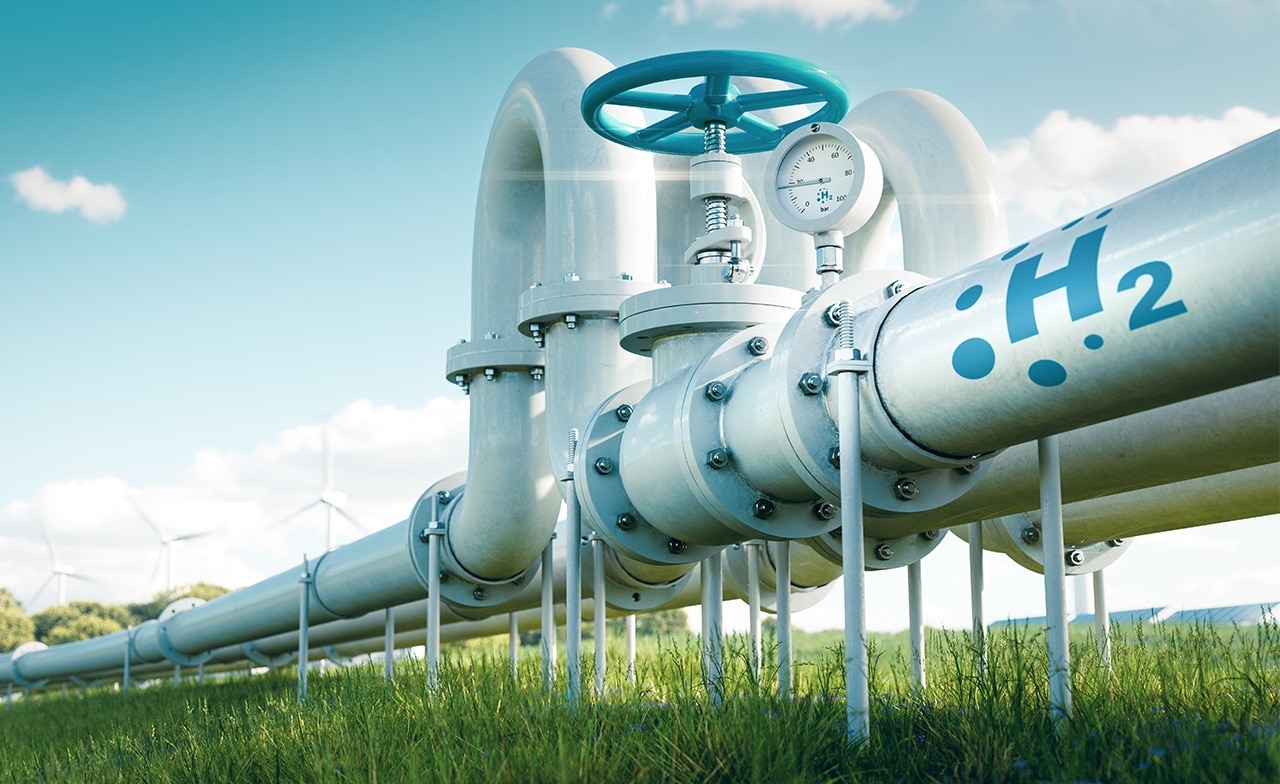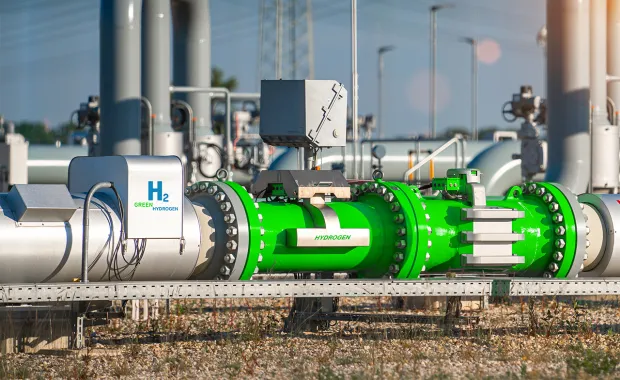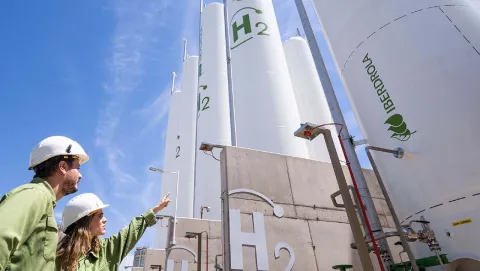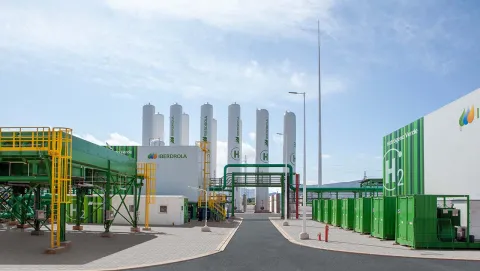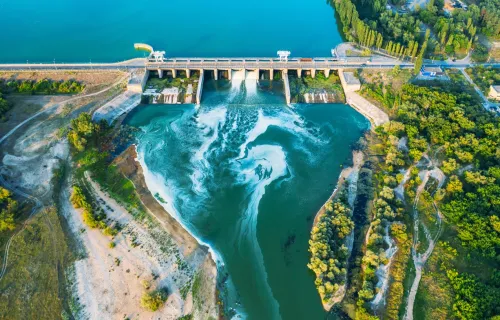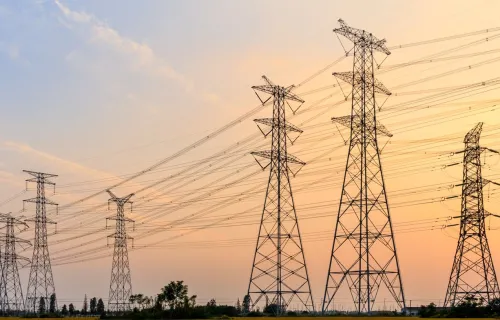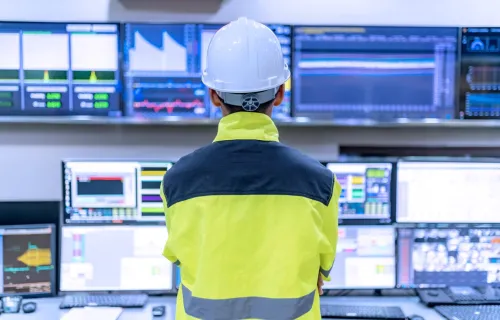Iberdrola began to transform their business model more than 20 years ago, anticipating the energy transition to meet the challenges of climate change. Since then, the company has moved actively and decisively to contribute to a more sustainable future.
Providing end-to-end production, control and monitoring of Europe's largest green hydrogen plant for industrial use
Iberdrola chose CGI to implement an end-to-end solution that monitors the green hydrogen production process of the Puertollano plant. The solution gives Iberdrola operators the tools, indicators and alarms needed to guarantee the complete manufacturing process. It integrates with systems that control the energy production of the PV plant and the production and supply of hydrogen to the plant.
Our work on the project began in June 2020, completed in September 2022, and we continue to make further enhancements. This work builds upon our relationship with Iberdrola, which began in 2019 with the development of SCADA* systems for their Pizarro (600 MW) and Ceclavín (327 MW) PV plants. We also worked on the integration of 11 French wind farms into Iberdrola’s Renewable Energy Control Center (CORE). Our experts collaborate with the client’s engineering teams on the definition of control, communications and cybersecurity architectures.
Standardization accelerates deployment and reduces costs
Iberdrola’s strategy of investing in industrial green hydrogen production requires ease of replicating the production plants and integrating them into the Control Center for global visibility of production and to support decision-making.
Our solution and services standardize and unify the data generated in production plants to facilitate integration and management. Additionally, we host our production management solution, and the associated control electronics, in control cabinets, install them in containers and can deliver them anywhere the client wishes, without borders. Standardizing the control solution (from cabinets to cabling) speeds deployment and reduces the time and cost of construction and testing.
Key solution elements
The key elements of the production control solution include:
- Local Control System (LCS) for hydrogen production for hybrid plants; the LCS provides management reports and production indicators to operators and centralized systems
- End-to-end solution that supervises the hydrogen production process obtained through a renewable energy source
- Ability to integrate into a Corporate or Central Production Management System of Industrial Plants
Value delivered
Among its benefits, the system helps to:
- Advance Iberdrola’s strategic objectives for their energy transformation and compliance with European 2030 and 2050 decarbonization plans
- Increase availability through real-time monitoring of plant operations and assets, and remote control of assets, enabling faster response to production alarms
- Increase efficiency and revenue, and decrease OPEX, avoiding energy losses and downtime of other assets
- Balance consumption need and guarantee the needs of energy, hydrogen and/or derivatives are met, ensuring an efficient, economical and sustainable operation
- Improve the management of hybrid plants
- Improve decision-making, both strategic and operational:
- Strategic: allows investors to "close the design cycle" and make strategic and tactical decisions to optimize their returns
- Operational: enables decisions about when and how much energy or hydrogen to produce, store, consume or sell
Solution topology overview
The solution topology supports high availability and cybersecurity, with a robust architecture, redundant at all levels and mitigating risk. The system’s multi-zone interface guarantees usability. It shows the main production indicators of the plant, process / subprocess, main production data and associated subprocesses, equipment documentation, etc.
Two parameters control the end-to-end system:
- The energy the electrolyzer can consume. Under normal conditions, the electrolyser keeps the storage tanks at maximum capacity, seeking the lowest cost of energy at all times. If necessary, an attempt is made to receive energy from the grid; for example, when there is insufficient contribution of green energy from the associated plant; when the Delegated Dispatch sends a consumption limitation for a period of time; or, when an anomaly does not allow the electrolyser to continue producing (e.g., breakdown, unavailability of distilled water, etc.).
- The constant flow rate of hydrogen to the industrial plant. The system receives a table with the production needs of the plant, in periods of stability of one hour, in which the flow must remain constant. The system manages the supply based on the storage in the tanks, which should provide two days of supply autonomy, even if there is no hydrogen production.
CGI advantages for partnership
Iberdrola chose CGI for this work based on several criteria. Among these was their confidence in our demonstrated experience and knowledge of their operations, after several years of working together to build local and corporate SCADA systems for their PV plants. Also important is our commitment to use open and standard commercial platforms and communications protocols to ensure Iberdrola is not captive to any proprietary solution.
Our differentiating value to Iberdrola includes the ability to integrate the production control solution with different equipment manufacturers, as well as our knowledge in developing object libraries that allow the rapid integration of a new system. CGI’s proactive ways of working, collaboration and rapid response to the client’s needs for future projects all are important criteria for this client partnership.
Green hydrogen is key to energy transformation for Iberdrola
Green hydrogen is key for Iberdrola in its energy transformation and compliance with net-zero commitments of the 2030 and 2050 European decarbonization plans, as well as to improving the energy independence of Spain and the competitiveness of the industry. The company is a pioneer in making green hydrogen a reality with projects for industrial use and heavy mobility.
Iberdrola commissioned the largest green hydrogen plant for industrial use in Europe. The Puertollano plant in Spain includes a 100 MW photovoltaic (PV) solar plant, a lithium-ion battery system with 20 MWh storage capacity and one of the largest electrolyzers in Europe, with a 20 MW capacity,all from 100% renewable electricity. The initiative will create up to 1,000 jobs and prevent emissions of 48,000 tCO2/year.
The green hydrogen will be used at a fertilizer plant, replacing their use of gray hydrogen from refineries and avoiding CO2 emissions.
Iberdrola has put into operation the first hydrogen supply station commissioned in all of Spain, a facility with green hydrogen production on site, in the Barcelona Free Trade Zone. This will supply clean energy to heavy mobility, specifically to the metropolitan buses of the TMB (Transports Metropolitans de Barcelona), with 8 green hydrogen buses currently operating in the city of Barcelona.
The facility has a 2.5 MW power electrolyzer, with a production capacity of up to 400 tons of green hydrogen per year. This is supplied by dispensing to heavy vehicles with high supply pressure needs, up to 450 bars of pressure.
The installation will make it possible to supply other fleets of heavy vehicles and industries in the area that adopt this vector as an energy solution. The aim is to generate a tractor effect around this technology and promote the creation of a green hydrogen hub in one of the main industrial areas of the country, in line with the principles of the European Hydrogen Strategy and the Hydrogen Roadmap of the Spain Ministry for the Ecological Transition and the Demographic Challenge.
Looking ahead
The Puertollano plant established the strategy for implementing and deploying hydrogen production technology. CGI has developed core knowledge for building a highly replicable solution and framework. We are now working with Iberdrola on the control system for their industrial hydrogen plant in Castellón, Spain, and will develop the Control Center (Centro Operación Producción Industrial) to manage production of both hydrogen production and thermal power plants (heat and cold).
The objective is to integrate the Puertollano and Castellón plants to the Control Center (COPI). All of these projects support Iberdrola's strategy to deploy numerous industrial plants, both hydrogen and thermal, as part of their energy transformation.
* SCADA (supervisory control and data acquisition) is a category of software applications for controlling industrial processes, which is the gathering of data in real time from remote locations in order to control equipment and conditions. SCADA provides organizations with the tools needed to make and deploy data-driven decisions regarding their industrial processes.
